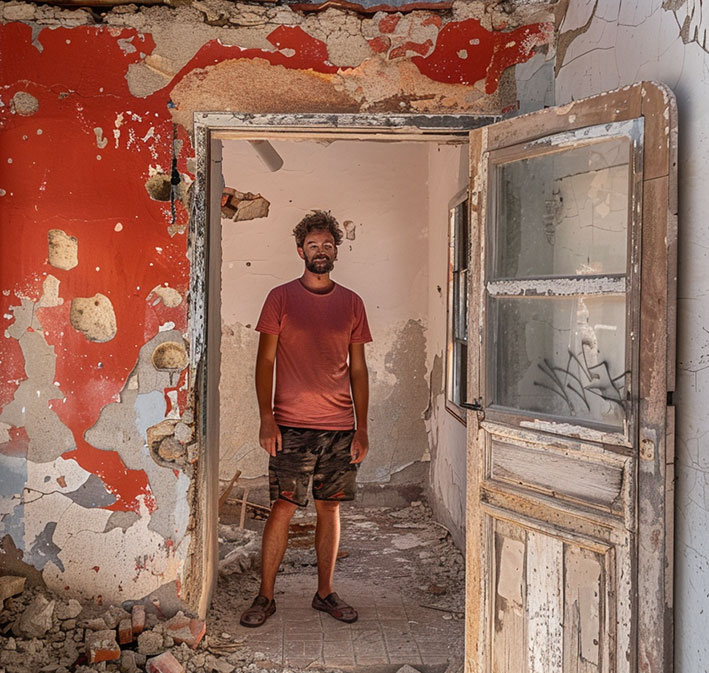Our resident expert, Mathew Wood of Hola Properties – headquartered in Lanjarón – explains why illegal property rentals are driving up prices across the board and what could be done about the situation…
IN RECENT years, the rise of illegal rentals and holiday lets has become a contentious issue in many parts of Spain. It is affecting the housing market and contributing to wider economic and social implications – such as making rent unaffordable for many people, especially those just getting their foot on to the rental ladder.
But why are these unregulated practices from landlords driving up prices and creating an uneven playing field for legal operators? This is an undesirable situation that affects tenants throughout Spain – including here in Granada region and popular tourist areas, such as La Alpujarra.

The rise of illegal rentals
Spain’s beautiful landscapes, sunny weather, and vibrant culture make it a prime destination for tourists and expats alike. Consequently, the demand for holiday accommodation has soared in the tourist hot spots. Many property owners have capitalised on this demand by renting out their homes as short-term holiday lets, at a premium price compared to longer-term rentals. We have seen everything rented – from ‘casitas’ to yurts, wooden sheds and even caravans.
However, a significant number of these rentals are operating illegally and without the necessary tourist licence, advertising their properties on social media and other platforms without providing their licence numbers.
The financial benefits for illegal operators
Operating without a license offers several financial benefits to property owners. By avoiding the formal registration process, they can skip the costs associated with obtaining a licence, such as inspections and compliance upgrades. Furthermore, many of these illegal rentals accept cash payments from the tenants, allowing them to evade taxes and other fees. This helps them maximise their personal profits, as they don’t declare their full income. Keeping ‘black’ money can be all too tempting for some landlords.
The impact on property standards
Licensed properties are required to meet specific standards to ensure safety and comfort for tenants. However, illegal rentals frequently do not comply with these minimum standards, as the owners aren’t subject to the same regulatory scrutiny. This lack of compliance can lead to substandard living conditions for tenants, who may be unaware of the property’s legal status, or unable to do anything about it when the landlord fails to repair failing items.

The ripple effect on legal rentals
Those who operate legally incur higher costs because of licencing fees, taxes, and necessary compliance upgrades. To cover these expenses, they are frequently forced to increase their rental rates. However, illegal operators – free from these financial burdens – can afford to undercut the market while still reaping higher profits. This creates an unfair competitive advantage for them personally, forcing legally-compliant landlords to raise prices for their rentals to remain viable.
The long-term let market
The issue extends beyond holiday lets and also affects the long-term rental market. Illegal long-term rentals are frequently conducted without proper contracts or registered deposits. This lack of formal agreement can lead to tenants being abused in various ways, such as the withholding of deposits or neglecting essential maintenance tasks. Additionally, by avoiding taxes on rental income, these landlords further boost their profits at the expense of their tenants’ legal protections.
The vicious cycle
This scenario sets off a vicious cycle in the rental market. As illegal operators continue to evade costs and maximise profits, the disparity between legal and illegal rentals grows. Those renting their properties out legally find themselves at a disadvantage, unable to compete with the lower prices of illegal rentals. Consequently, they are forced to raise their rates to cover costs, inadvertently pushing overall market prices higher.
The problem is exacerbated as more property owners are tempted to follow the illegal route to remain competitive. This perpetuates the cycle, leading to an increasingly unaffordable rental market for both holidaymakers and long-term tenants. There was recently a case in Ibiza of caravans being rented out for 1,000e pcm, just as an off-the-cuff example.
Addressing the issue
Addressing this issue of illegal rentals requires a multi-faceted approach. Increased regulatory enforcement is essential to identify and penalise the landlords. This includes better monitoring of the online platforms where these properties are advertised and more rigorous inspections of properties.
Furthermore, public awareness campaigns can help educate property owners and tenants about the importance of compliance and the risks associated with illegal rentals – such as incurring a large penalty fine!
There is an anecdote of an inspector booking an illegally-advertised rental and then telling the owner that they had two choices: be sanctioned (possibly for a huge amount) or pay tax on the whole year at the rate the inspector paid for a week’s accomodation during high season.
In Granada province, the situation is becoming more complex with regulations for room size, air conditioning, and other stipulations that some landlords might not be able to meet easily.
Incentives for legal compliance, such as tax breaks or subsidies for property upgrades, could also encourage more owners to operate within the law. Lastly, a streamlined and transparent licencing process would make it easier for property owners to obtain the necessary permits and stick to regulations.
Will the situation end soon?
The prevalence of illegal rentals and holiday lets in Spain’s popular areas is undeniably driving up prices and creating an unfair market. .
To protect tenants and ensure a fair and sustainable rental market, it is crucial to address these illegal practices through stricter enforcement and supportive measures for legal compliance. Whether or not this will happen soon is down to the relevant authorities here in Spain.

